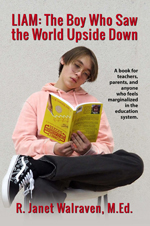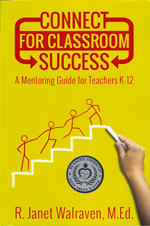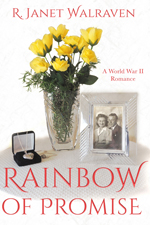Award-winning author R. Janet Walraven, M.Ed., has written a children’s book, a World War II romance based on her parents’ lives, and two nonfiction books inspired by 35 years of K-12 teaching experience. Through her decades-long career, Janet developed a passion for connecting all of the players in the education field and believes it is possible to experience joy in teaching and in learning. Her mentoring book, Connect for Classroom Success, won the Silver Award with Readers’ Favorite International Book Awards. Janet’s newest nonfiction release is LIAM: The Boy Who Saw the World Upside Down (February 2023). You’ll find her on Facebook, Instagram, and Twitter/X. Look for her books on her Amazon Author Page.
 Your newest book is an inspirational nonfiction story about a boy who was almost lost within the educational system. What would you like readers to know about LIAM: The Boy Who Saw the World Upside Down?
Your newest book is an inspirational nonfiction story about a boy who was almost lost within the educational system. What would you like readers to know about LIAM: The Boy Who Saw the World Upside Down?
LIAM is a story of hope for those who have been academically misdiagnosed as well as marginalized. The true story is about a student I had many years ago. It’s been rolling around in my head for a long time.
Did this work present any challenges for you as a writer?
Two huge challenges. The first was finding my student from 40 years ago to get his permission for me to write the story. That took some detective work. We finally connected. His response was, “If the story can give hope to others, let’s do it.” I am grateful for his approval. The second challenge was putting myself back in the trauma of the situation; Liam felt the same way.
What did you consider your biggest challenge as an educator? What do you consider your greatest success?
My greatest challenge was finding a reading program that really works. I searched for 16 years and finally found what can change the lives of the 85% of students who don’t read correctly. If I win the lottery, I’ll get the Read Right program into every school in the USA. If Read Right had been available for Liam at the time, he could have become an excellent reader in a short time.
What I learned from Liam was that my job as a teacher was to connect with each individual student to help them realize their potential. I believe that everyone has a genius; the teacher’s job is to help them find it, set goals, and reach for the stars.
If you could offer one piece of advice for parents struggling with this type of situation, what would it be?
Don’t ever give up on your children. Don’t allow anyone to diagnose and label your child. If educators aren’t searching for a solution, be the advocate for your child. You will be amazed if you stay on that journey. Hope is out there. Keep believing, searching, asking for help, keeping hope in your heart. Liam was fortunate to have loving, supportive parents. They accepted him just as he was and did all they could to find solutions for him.
You’ve written in many genres: Children’s, Essay, Historical Fiction, Inspirational, Memoir, Narrative Non-Fiction/Education, Poetry, Romance. Has your nonfiction writing enabled you to make the transition into writing other genres easier?
I find it difficult to label my nonfiction as well as fiction. Both of my nonfiction books are true stories, but since I have to change character names, it becomes fiction of a sort. In writing Rainbow of Promise, the book about my parents’ romance, I used their real names. Though it’s historical fiction, the stories were true. I wrote the dialogue as close as possible to their personalities and the stories they told me.
I usually write from my own experiences—people I know as well as situations others have shared with me. Once in a while, a story pops into my head without my knowing where it came from; it seems to dictate to me. That’s a strange feeling but fun!
 When you tackle a nonfiction project, do you think of it as storytelling?
When you tackle a nonfiction project, do you think of it as storytelling?
Absolutely! My first book, Connect for Classroom Success: A Mentoring Guide for Teachers K-12, is mostly dialogue between students, parents, colleagues, and me. Who wants to read a boring textbook? I wrote it because so many teachers don’t have a mentor and give up their career in three to five years. The stories I tell are there to help teachers, parents, students, all the team players, find joy in teaching and learning. Storytelling is the best way. I wanted the book about Liam to be personal, including the struggles I had right along with him. Dialoguing is my favorite way to tell a story.
Of all the books you’ve written, is there one that was the most enjoyable to write?
I love being in the writing zone. Hours go by without my knowing where I am or what time it is. I found the most joy in writing the World War II romance about my parents’ love story. My goal was to be as true to the stories they told me while growing up and to reveal their true personalities. I enjoyed being in their heads, re-creating dialogue and situations as close to reality as possible. I’m working on a prequel to the story.
What does a typical writing session look like for you?
I write when I feel compelled to get a story out of my head and into a manuscript. Once I get started, it’s hard to stop. I have a nice setup—a quiet room with a computer on a desk facing a window, music without lyrics that fits the story, and a timer that tells me when I need a break. I usually ignore when it dings. I never have what others call writer’s block. I have so much in my head that I want to get out onto paper, there’s no time for a block. I write for the joy of writing, not to get rich or famous. I do appreciate reviews!
What first inspired you to become a writer?
I wrote my first serious poem as a senior in high school. My psychology teacher took us on a field trip to a nearby mental institution—a trauma that shook me to my core. On the way home, I wrote a short poem—the only way I knew to respond. After that, I found writing poetry came from deep within, whatever the circumstance. When I was twenty-five, my father was killed, supposedly accidentally, but I couldn’t reconcile myself to it. After several starts, hoping for a catharsis, I finally found my voice. I entered the story in the SouthWest Writers’ Contest (2001) and was awarded second place in Mainstream Short Story for Realistic Fiction. At that time, SouthWest Writers held conferences where we were able to meet with the judges. That was the validation I needed to pursue writing. Thank you, SouthWest Writers!
What advice can you offer other authors?
Write from your heart. Take advantage of writing seminars. Learn the rules of writing well enough to know when to break rules. Find a writing partner or group you feel comfortable with, but don’t take critiquing personally. Learn what you can from others but stick to your own voice. Writing takes a great deal of patience. I work with a writing partner plus two others who critique my manuscripts. Editing takes even more patience. A true writer is never done; rewrite and edit until you can finally say, I’ve got it as good as it gets. Then after publishing, you think of more to add or how you could have changed something. That’s what nice about self-publishing; you can always make changes or corrections in another edition. I don’t backtrack unless a typo or content mistake needs to be corrected. Otherwise, I move on to my next project, and that’s exciting.
 Since you write across many genres, is there a genre you enjoy reading the most and why?
Since you write across many genres, is there a genre you enjoy reading the most and why?
I like believable stories that fit my mood at the time—biographies, memoirs, true-to-life stories, well-written novels, and mysteries only if they make me laugh out loud. I don’t like violence and am not much into fantasies unless it’s metaphorical. I journal self-help books; that makes me slow down my fast reading in order to capture what I want to learn. After teaching the Holocaust for twenty-five years, I keep telling myself that I can no longer allow myself to sink into that horror. But another comes along, and I feel compelled to read yet another.
Do you have any other works in progress that you can tell us about?
Two projects are exciting. The first is a prequel to my WWII romance. It’s a story about my maternal Volga-German grandparents who emigrated from Russia in 1912. That’s taking a lot of research. I love researching because I learn a lot of history while picking the brains of my cousins, searching old photos and papers, and am grateful for the internet. My second project is writing a set of poetry books with varying themes and styles. I have most of the poetry written. Editing and organizing takes time.
Is there anything else you’d like readers to know?
For each of my nonfiction books sold, I gift a book to a teacher or parent.
 Su Lierz writes dark fiction, short story fiction, and personal essays. Her short story “Twelve Days in April,” written under the pen name Laney Payne, appeared in the 2018 SouthWest Writers Sage Anthology. Su was a finalist in the 2017 and 2018 Albuquerque Museum Authors Festival Writing Contest. She lives in Corrales, New Mexico, with her husband Dennis.
Su Lierz writes dark fiction, short story fiction, and personal essays. Her short story “Twelve Days in April,” written under the pen name Laney Payne, appeared in the 2018 SouthWest Writers Sage Anthology. Su was a finalist in the 2017 and 2018 Albuquerque Museum Authors Festival Writing Contest. She lives in Corrales, New Mexico, with her husband Dennis.



























A very very nice interview. Both interviewer and interviewee has done their best
in questioning and answering. Kudos to both of them!!